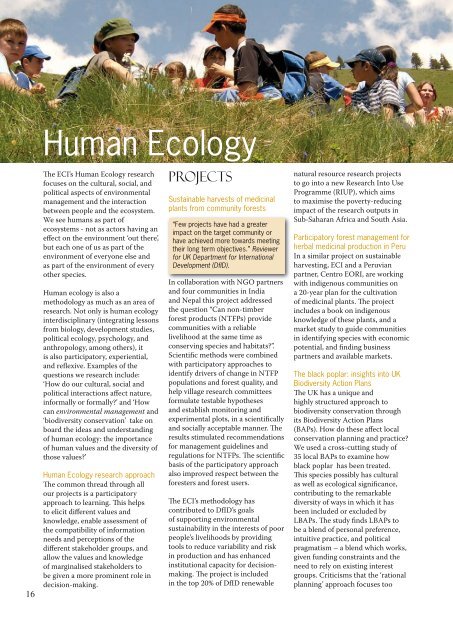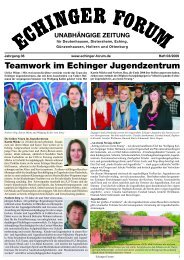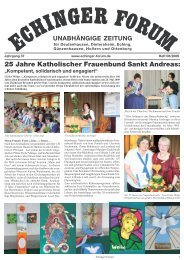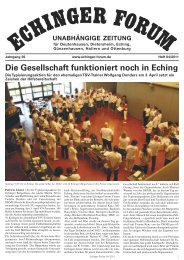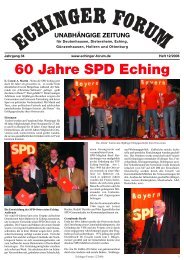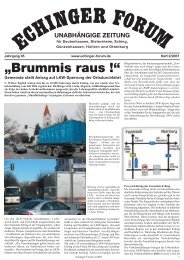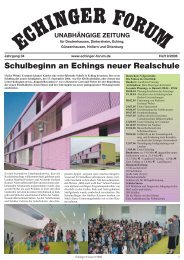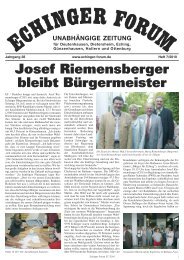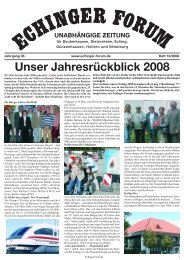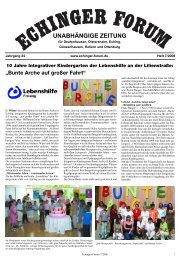Büro Karl Holmer Sachverständiger für Kraftfahrzeuge - Echinger Forum
Büro Karl Holmer Sachverständiger für Kraftfahrzeuge - Echinger Forum
Büro Karl Holmer Sachverständiger für Kraftfahrzeuge - Echinger Forum
You also want an ePaper? Increase the reach of your titles
YUMPU automatically turns print PDFs into web optimized ePapers that Google loves.
16<br />
Human Ecology<br />
The ECI’s Human Ecology research<br />
focuses on the cultural, social, and<br />
political aspects of environmental<br />
management and the interaction<br />
between people and the ecosystem.<br />
We see humans as part of<br />
ecosystems - not as actors having an<br />
effect on the environment ‘out there’,<br />
but each one of us as part of the<br />
environment of everyone else and<br />
as part of the environment of every<br />
other species.<br />
Human ecology is also a<br />
methodology as much as an area of<br />
research. Not only is human ecology<br />
interdisciplinary (integrating lessons<br />
from biology, development studies,<br />
political ecology, psychology, and<br />
anthropology, among others), it<br />
is also participatory, experiential,<br />
and reflexive. Examples of the<br />
questions we research include:<br />
‘How do our cultural, social and<br />
political interactions affect nature,<br />
informally or formally?’ and ‘How<br />
can environmental management and<br />
‘biodiversity conservation’ take on<br />
board the ideas and understanding<br />
of human ecology: the importance<br />
of human values and the diversity of<br />
those values?’<br />
Human Ecology research approach<br />
The common thread through all<br />
our projects is a participatory<br />
approach to learning. This helps<br />
to elicit different values and<br />
knowledge, enable assessment of<br />
the compatibility of information<br />
needs and perceptions of the<br />
different stakeholder groups, and<br />
allow the values and knowledge<br />
of marginalised stakeholders to<br />
be given a more prominent role in<br />
decision-making.<br />
Projects<br />
Sustainable harvests of medicinal<br />
plants from community forests<br />
“Few projects have had a greater<br />
impact on the target community or<br />
have achieved more towards meeting<br />
their long term objectives.” Reviewer<br />
for UK Department for International<br />
Development (DfID).<br />
In collaboration with NGO partners<br />
and four communities in India<br />
and Nepal this project addressed<br />
the question “Can non-timber<br />
forest products (NTFPs) provide<br />
communities with a reliable<br />
livelihood at the same time as<br />
conserving species and habitats?”.<br />
Scientific methods were combined<br />
with participatory approaches to<br />
identify drivers of change in NTFP<br />
populations and forest quality, and<br />
help village research committees<br />
formulate testable hypotheses<br />
and establish monitoring and<br />
experimental plots, in a scientifically<br />
and socially acceptable manner. The<br />
results stimulated recommendations<br />
for management guidelines and<br />
regulations for NTFPs. The scientific<br />
basis of the participatory approach<br />
also improved respect between the<br />
foresters and forest users.<br />
The ECI’s methodology has<br />
contributed to DfID’s goals<br />
of supporting environmental<br />
sustainability in the interests of poor<br />
people’s livelihoods by providing<br />
tools to reduce variability and risk<br />
in production and has enhanced<br />
institutional capacity for decisionmaking.<br />
The project is included<br />
in the top 20% of DfID renewable<br />
natural resource research projects<br />
to go into a new Research Into Use<br />
Programme (RIUP), which aims<br />
to maximise the poverty-reducing<br />
impact of the research outputs in<br />
Sub-Saharan Africa and South Asia.<br />
Participatory forest management for<br />
herbal medicinal production in Peru<br />
In a similar project on sustainable<br />
harvesting, ECI and a Peruvian<br />
partner, Centro EORI, are working<br />
with indigenous communities on<br />
a 20-year plan for the cultivation<br />
of medicinal plants. The project<br />
includes a book on indigenous<br />
knowledge of these plants, and a<br />
market study to guide communities<br />
in identifying species with economic<br />
potential, and finding business<br />
partners and available markets.<br />
The black poplar: insights into UK<br />
Biodiversity Action Plans<br />
The UK has a unique and<br />
highly structured approach to<br />
biodiversity conservation through<br />
its Biodiversity Action Plans<br />
(BAPs). How do these affect local<br />
conservation planning and practice?<br />
We used a cross-cutting study of<br />
35 local BAPs to examine how<br />
black poplar has been treated.<br />
This species possibly has cultural<br />
as well as ecological significance,<br />
contributing to the remarkable<br />
diversity of ways in which it has<br />
been included or excluded by<br />
LBAPs. The study finds LBAPs to<br />
be a blend of personal preference,<br />
intuitive practice, and political<br />
pragmatism – a blend which works,<br />
given funding constraints and the<br />
need to rely on existing interest<br />
groups. Criticisms that the ‘rational<br />
planning’ approach focuses too


